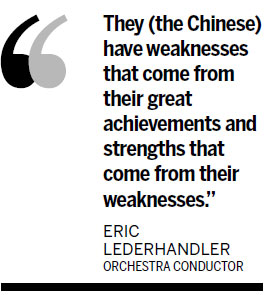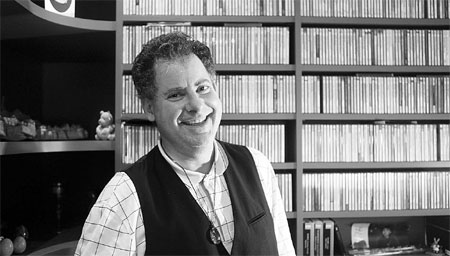Like father, like son
Updated: 2014-01-12 08:37
By Fu Jing(China Daily)
|
|||||||||
A Belgian conductor is determined to introduce the pleasures of Western classical music to more people in his adopted second motherland, Fu Jing reports.
Belgian orchestra conductor Eric Lederhandler is following his energetic father in fostering friendship between China and Belgium. Eric's father, Henri Lederhandler, began using his business acumen in the 1960s, when there was little contact between Western countries and China, to foster relations between the new republic and his native Belgium.
Now, Eric uses his concert tours to China to deepen those relations.
As the son of one of the most important founders of the modern China-Belgium relationship, Eric says he has more close friends in China than in his own country.
Lederhandler can still remember his first trip to the "second motherland" of his father in 1993. He was invited to Beijing to attend the 30th anniversary celebration of the founding of his father's import-export corporation.
Though he grew up with Chinese diplomats, politicians and businessmen visiting his home, that trip was still a culture shock for the then 28-year-old Belgian.
"I was shocked by the difference, the construction everywhere, the infrastructure and the way of life," recalls the now 48-year-old conductor, as he relaxes in his house in Wemmel, on the outskirts of Brussels, which is decorated with many Chinese souvenirs.
Ten years later, he was invited to revisit Beijing to conduct the Chinese National Symphony Orchestra. He found a completely different city on his second visit.
As a conductor working with many Chinese orchestras, such as the Central Philharmonic Orchestra and the national, Lederhandler has seen how these orchestras operate.
"Orchestras in Shanghai and Beijing work more like the way we do in the West, from their organization, their mental approach to the way they handle the artists," he says. He thinks provincial orchestras operate in a more traditional, casual and flexible way.
He says the Chinese are prone to changing plans at short notice. It has taken Lederhandler 10 years to get used to this approach but eventually he has grown to like it.
At the same time, he regrets that only some Chinese fully appreciate Western classical music, while most are not educated in it.
"In such a huge city like Beijing, where more than 20 million people live, it's still hard to attract enough people to fill a venue, even when a concert is held in the Forbidden City with US conductors."
Having conducted and given masterclasses in cities such as Nanjing, Beijing, Xi'an, Chengdu and Shanghai as well as living in China for quite a while, Lederhandler believes the challenge China faces now is to find a balance in its development between Eastern and Western influences and to keep certain traditional values. "Knowledge of and respect for history are essential," he says.
Having grown up in downtown Brussels before moving to Wemmel on the city's outskirts when he was 17, Lederhandler considers himself a true child of Brussels. Due to the nature of his father's work, he grew up having easy access to Chinese culture and people.
His perception of the Chinese: "They have weaknesses that come from their great achievements and strengths that come from their weaknesses."
As a conductor who gives 10 to 12 concerts in China every year, Lederhandler leads a more varied life that those who go to an office every day would envy. But that life can be complicated.
"You have to be prepared because you know sometimes it's like you're naked in front of 90 people," he jokes. "You have to be in good condition both physically and mentally."

Half of a conductor's job is to manage the music and the musicians' technique, and the other half is dealing with people's personalities. "You get surprises all the time," he says.
At the Royal Conservatory of Brussels, Lederhandler completed a diploma in choir-conducting and later benefited from attending orchestra rehearsals conducted by two masters, Frank Shipway from Britain and Yuri Simonov from Russia.
He believes there is a sort of wall between Chinese people and Westerners because of cultural differences and the way the Chinese approach relationships.
"When you go a little behind this wall, you'll get the trust you won't get here in Brussels. In China people happily share their phone numbers," he says.
His father, Henri, helped found the Belgium-China Friendship Association, which acted as the first bridge connecting the countries.
This was one of the reasons Henri was visited by Premier Li Keqiang at his home in Wemmel in May 2012. His meetings with great minds like Mao Zedong, Zhou Enlai and Wu Xueqian in the 1950s and '60s in Europe and China helped lay the foundation of that later friendship between the two countries.
Inspired by his father, Lederhandler believes his job as a conductor is to try to bring knowledge of Western music to China.
"I was lucky to have two great masters who transferred their knowledge to me, and I'm happy to share it with my Chinese friends," says the cultural messenger. "To learn how to play music is to learn a way of life."
Contact the writer at fujing@chinadaily.com.cn.
Li Xiaofei contributed to this story.
|
Conductor Eric Lederhandler is following his pioneering father in fostering friendship between China and Belgium. Fu Jing / China Daily |
(China Daily 01/12/2014 page5)
